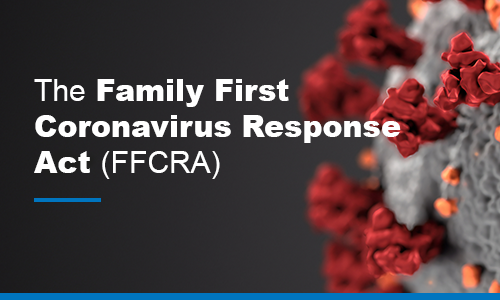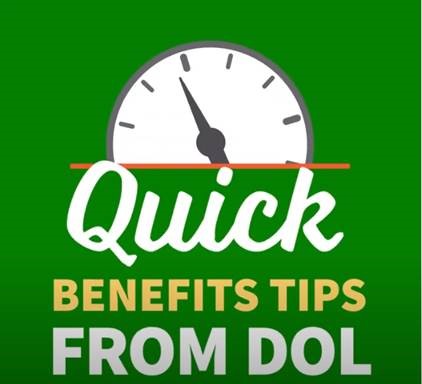FFCRA Leave Requirements Expired Dec. 31, 2020
The requirement that employers provide paid sick leave and expanded family and medical leave under the Families First Coronavirus Response Act (FFCRA) expired on Dec. 31, 2020. Please visit the Wage and Hour Division’s FFCRA Questions and Answers page to learn more about workers’ and employers’ rights and responsibilities after this date.

On September 11, 2020, the U.S. Department of Labor’s Wage and Hour Division (WHD) announced revisions to regulations that implement the paid sick leave and expanded family and medical leave provisions of the Families First Coronavirus Response Act (FFCRA).
The revised rule clarifies workers’ rights and employers’ responsibilities regarding FFCRA paid leave. The rule was issued in light of the U.S. District Court for the Southern District of New York’s April 3, 2020, decision invalidating portions of the relevant regulations.
The revisions allow WHD to enforce critical legal protections for millions of workers fully and fairly.
The Department issued its initial temporary rule implementing provisions under the FFCRA on April 1, 2020. Read the revised rule, which will take effect on September 16, 2020.
- News Release [09/11/2020]: U.S. Department of Labor Revises Regulations to Clarify Paid Leave Requirements under the Families First Coronavirus Response Act
On April 1, 2020, the U.S. Department of Labor announced new action regarding how American workers and employers will benefit from the protections and relief offered by the Emergency Paid Sick Leave Act and Emergency Family and Medical Leave Expansion Act, both part of the Families First Coronavirus Response Act (FFCRA).
FFCRA helps the United States combat the workplace effects of COVID-19 by reimbursing American private employers that have fewer than 500 employees with tax credits for the cost of providing employees with paid leave taken for specified reasons related to COVID-19. The law enables employers to keep their workers on their payrolls, while at the same time ensuring that workers are not forced to choose between their paychecks and the public health measures needed to combat the virus. The Department’s Wage and Hour Division administers the paid leave portions of the FFCRA.
The Department promulgated regulations to implement public health emergency leave under Title I of the Family and Medical Leave Act (FMLA) and emergency paid sick leave to assist working families facing public health emergencies arising out of the COVID-19 global pandemic. The leave provisions are created by a time-limited statutory authority established under the FFCRA and are set to expire on December 31, 2020. The temporary rule was operational on April 1, 2020 and is effective from April 2, 2020 through December 31, 2020. On April 10, 2020 the Department published a correction in the Federal Register to make certain technical corrections to the regulatory text and preamble of the temporary rule.
In this temporary rule, the Department:
- Issues rules relevant to the administration of the FFCRA’s paid leave requirements.
- Provides direction for administration of the Emergency Paid Sick Leave Act (EPSLA), which requires that certain employers provide up to 80 hours of paid sick leave to employees who need to take leave from work for certain specified reasons related to COVID-19. These reasons may include the following:
- the employee or someone the employee is caring for is subject to a government quarantine order or has been advised by a health care provider to self-quarantine;
- the employee is experiencing COVID-19 symptoms and is seeking medical attention; or,
- the employee is caring for his or her son or daughter whose school or place of care is closed or whose child care provider is unavailable for reasons related to COVID-19.
- Provides direction for the effective administration of the Emergency Family and Medical Leave Expansion Act (EFMLEA), which requires that certain employers provide up to 10 weeks of paid, and 2 weeks unpaid, emergency family and medical leave to eligible employees if the employee is caring for his or her son or daughter whose school or place of care is closed or whose child care provider is unavailable for reasons related to COVID-19.
This action is intended to provide guidance to the regulated community as they implement the statutory requirements.
- Temporary Rule: Paid Leave under the Families First Coronavirus Response Act
- Temporary Rule correction notice
- Press Release (4/1/2020): U.S. Department Of Labor Announces New Paid Sick Leave and Expanded Family and Medical Leave Implementation
- Revised Rule: Paid Leave under the Families First Coronavirus Response Act
- Licencia Laboral Pagada bajo Ley Familias Primero de Respuesta al Coronavirus
- Families First Coronavirus Response Act: Employee Paid Leave Rights (PDF)
- Ley Familias Primero de Respuesta al Coronavirus: Derechos del Empleado Sobre Licencia Laboral Pagada (PDF)
- Families First Coronavirus Response Act: Employer Paid Leave Requirements (PDF)
- Ley Familias Primero de Respuesta al Coronavirus: Derechos del Empleador Sobre Licencia Laboral Pagada (PDF)
- Quick Tip: How much paid leave can employees take?
- Employee Rights: Paid Sick Leave and Expanded Family and Medical Leave under The Families First Coronavirus Response Act (FFCRA)
- Federal Employee Rights: Paid Sick Leave and Expanded Family and Medical Leave under The Families First Coronavirus Response Act (FFCRA)
Note: The U.S. Office of Personnel Management (OPM) is responsible for enforcing compliance with the FFCRA paid sick leave provisions for the vast majority of Federal employees who are covered by OPM’s Fair Labor Standards Act regulations. For more information, go to https://www.opm.gov/policy-data-oversight/covid-19/opm-qa-which-agency-is-responsible-for-enforcing-compliance-with-the-provisions-of-the-emergency-paid-sick-leave-act-epsla-for-federal-employees/. [An agency should include this NOTE when distributing the Federal Employee Rights poster by email or mail or when posting the poster on an employee information website.] - Families First Coronavirus Response Act Notice – Frequently Asked Questions
For further information about Coronavirus, please visit the HHS’s Centers for Disease Control and Prevention.

